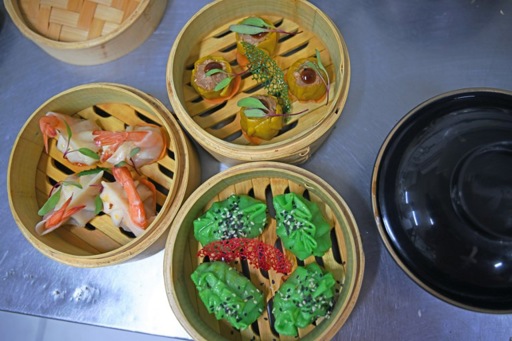Pork, chicken or shrimp dim sum, a typical Cantonese delicacy, are slowly steamed in a stall on the corner of an alleyway, but this is not Hong Kong, it's Rio de Janeiro.
And the chef is Afro-Brazilian.
"Many people who come here ask me where the Chinese chef is,” says Vladimir Reis, 38, who opened Dim Sum Rio almost two years ago in Laranjeiras, a trendy district in Brazil’s tourist capital.
“People often ask me why I chose to do Asian cuisine and not Brazilian or African. But I just want to do what I want to do, not restrict myself to what people think I should do because of my skin colour,” he adds.
Best Black chef
This young man with a strong build and thin dreadlocks that fall to his shoulders is on a roll. His dim sums are selling like hot cakes and he has just been named best chef in the Black Gastronomy Awards.
The awards, first held at the end of November, honour the sector's best black professionals in Rio in a variety of categories, from waiters to sommeliers, assistant cooks and pastry chefs, in a society where racism is still deeply rooted.
“There are so many great stories to be told, so many unsung talents, that it was time to bring them to light,” says Breno Cruz, the university professor who initiated the award.
In the 'best restaurant' category, the winner is Afro Gourmet, run by Dandara Batista, 37, who serves African cuisine in the working-class neighbourhood of Grajau, in north Rio, near Andarai where she grew up.
Hausa rice in Brazil
In the small kitchen of her restaurant, which opened in 2018, she lovingly prepares 'Hausa rice,' a dish originally from Nigeria with shrimp, dried meat and a golden sauce mixing coconut milk and palm oil.
On the menu, she also offers Senegalese mafé and South African chakalaka.
“I have always loved the cuisine of Bahia, where my father’s family comes from. But when I did some research, I saw how much the African influence has been decisive for Brazilian cuisine in general,” she explains.
Dandara Batista has been cooking with her family since she was a little girl, but she decided to make it her profession late in life, after working for a long time as a journalist.
Gastronomy was a 'very white world'
“For me, gastronomy was a very white world, I couldn’t see myself in it,” she recalls. Nevertheless, she decided to launch her career four years ago, after completing a course in gastronomy.
“There were no courses in African cuisine, so we learned how to prepare dishes from other countries far away from Brazil,” she says. As a good journalist, Dandara Batista got her information from the source, travelling to Angola, Cape Verde and Sao Tome and Principe.
Like Dandara Batista, Vladimir Reis’ life was marked by a trip - to Singapore. “It was there that I discovered dim sum. I found it delicious, very delicate, and above all, I said to myself: 'there is none in Rio'."
This pure Carioca brings his personal touch, with ingredients such as manioc or palm oil, used in Brazil as well as in Africa.
At Dim Sum Rio, the dishes are decorated with edible flowers or green tiles made from cabbage.
Vladimir Reis had previously worked in several restaurants, without ever reaching the rank of chef.
'They wanted me to be a kitchen assistant for my entire career'
“At job interviews, I saw white candidates selected instead of me even though my CV was better. They wanted me to be a kitchen assistant for my entire career,” says the Brazilian, who grew up in a favela in Santa Teresa, in central Rio.
In Brazil, blacks and mestizos represent nearly 54% of the population but occupy fewer than 30% of the positions of responsibility in companies.
Vladimir Reis confides that he would certainly have gone into business for himself earlier if he had seen more black leaders in the media.
“I only saw them in foreign programmes, but here in Brazil I had no references," he said. "The situation has changed in recent years, but racism is still very much a part of our society.”

